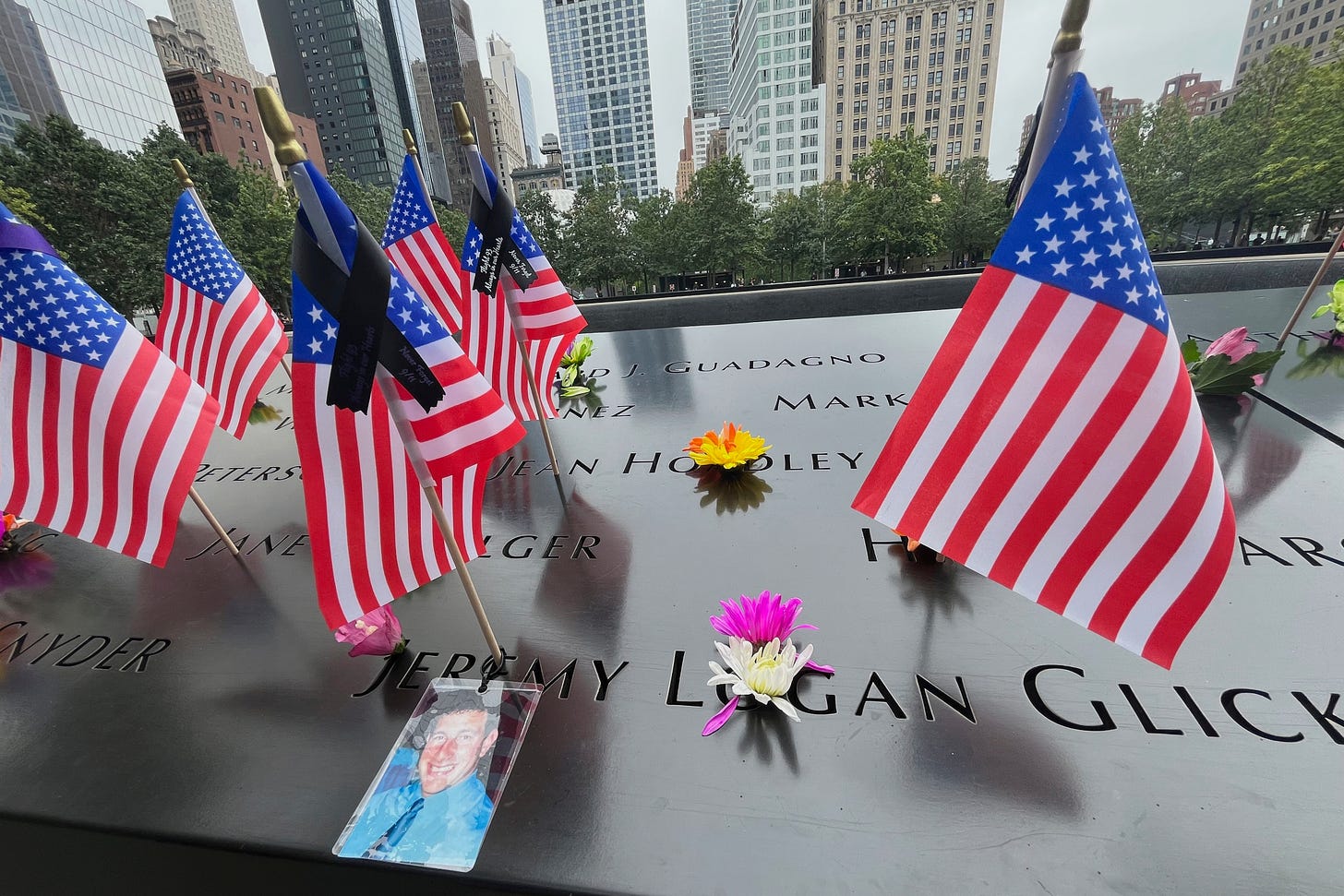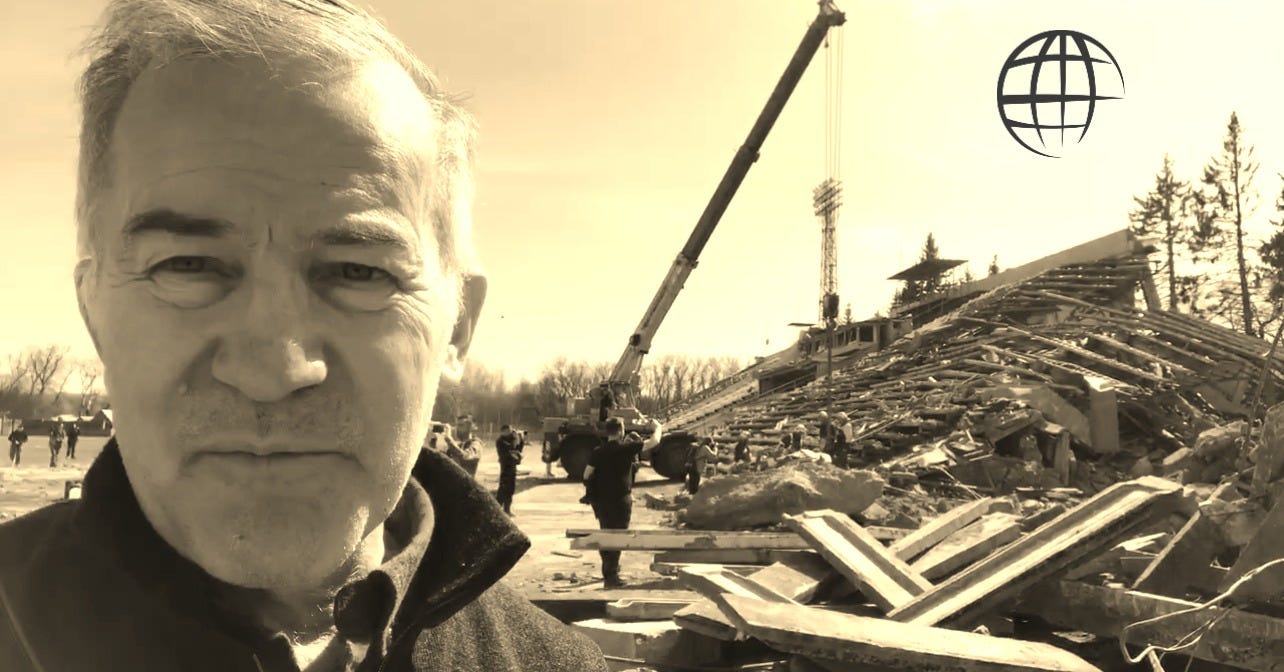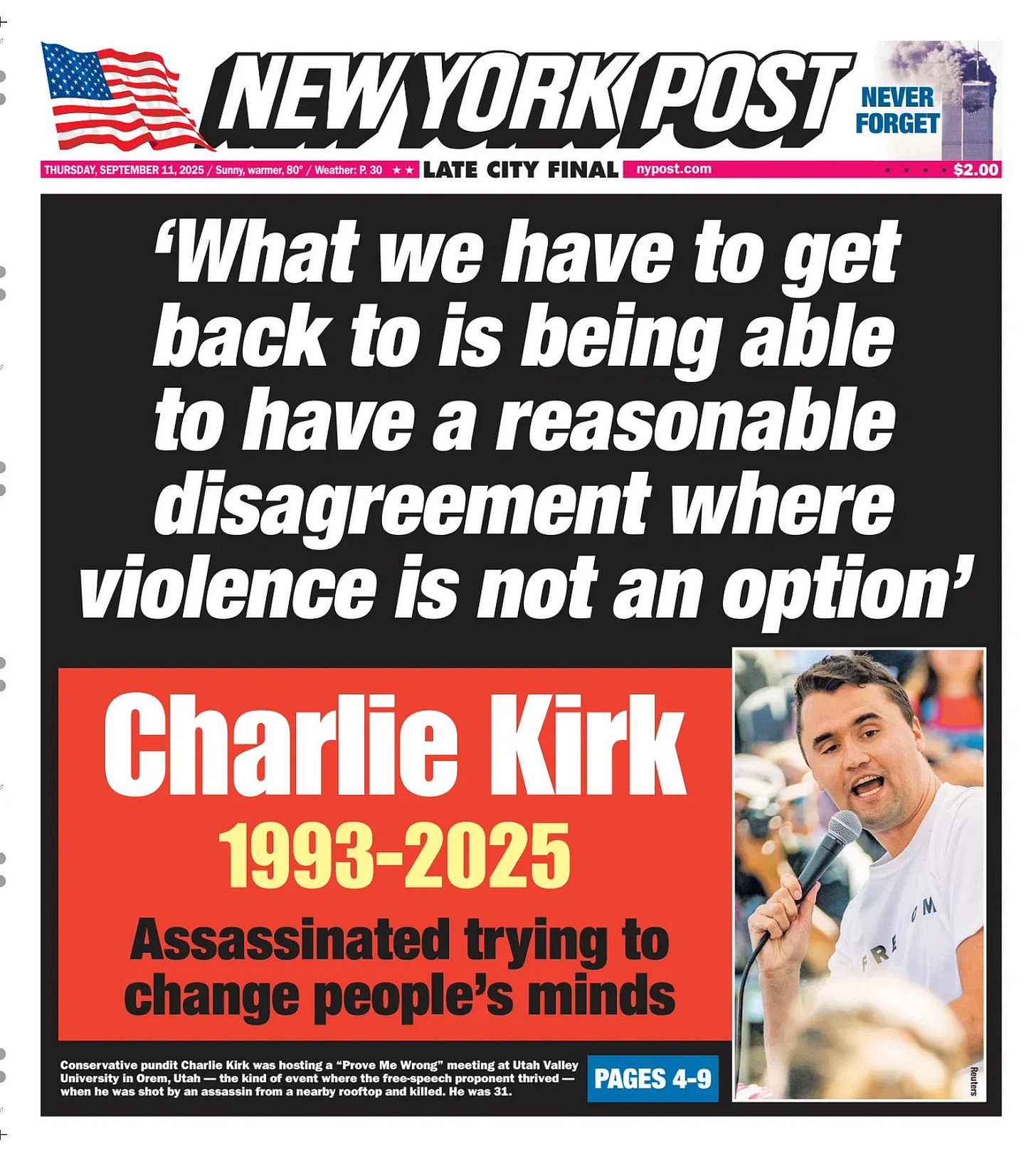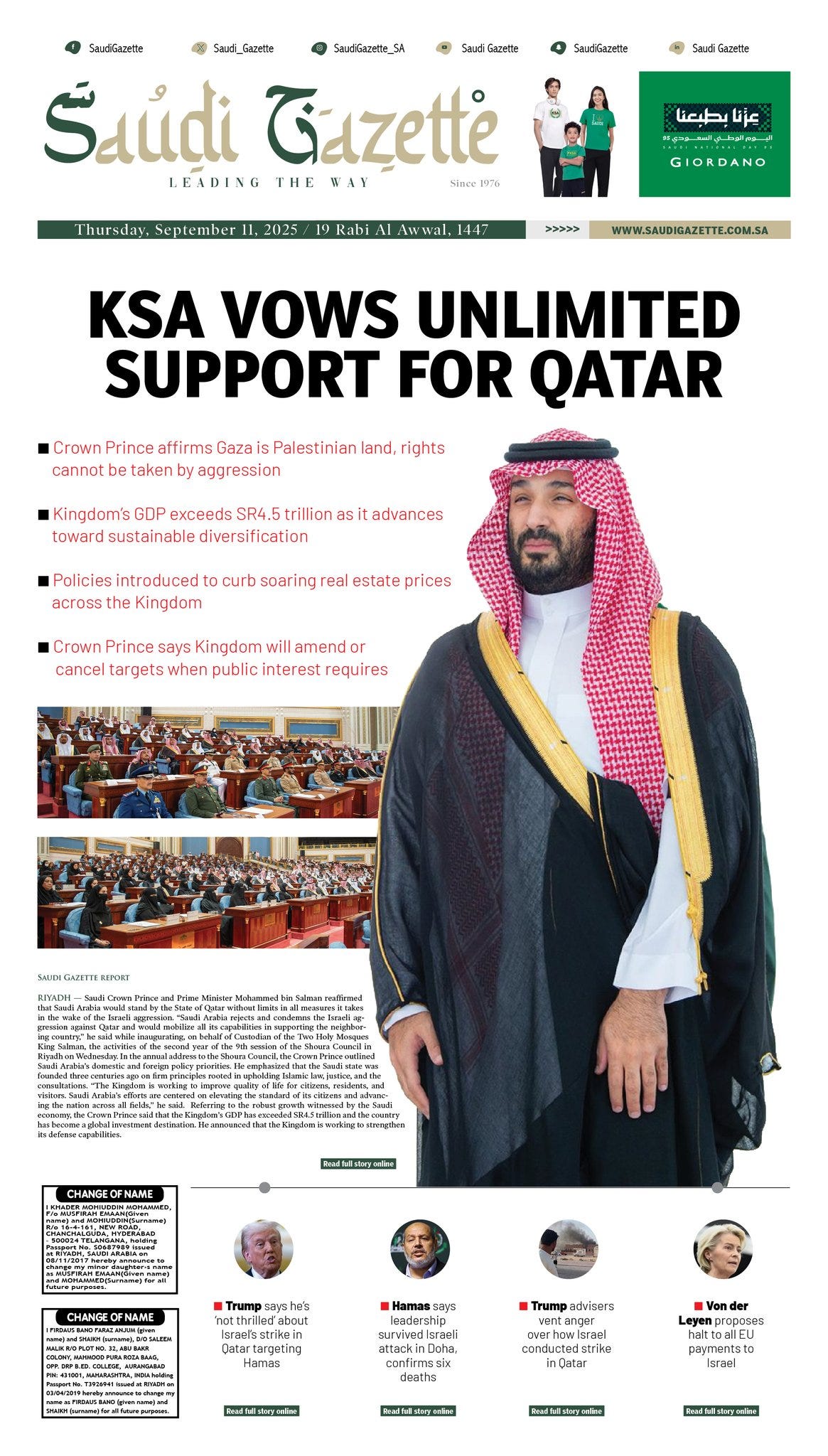From 9/11 Unity to Political Violence in Utah
As America reflects on its darkest day, Donald Trump calls Charlie Kirk’s assassination “a dark moment for America” — binding past tragedy with today’s political bloodshed.

Americans are marking 24 years since the Sept. 11, 2001, attacks with solemn ceremonies, volunteer work and other tributes honoring the victims. Many loved ones of the nearly 3,000 people killed will join dignitaries and politicians at commemorations Thursday in New York, at the Pentagon and in Shanksville, Pennsylvania. The remembrances are being held during a time of increased political tensions. The 9/11 anniversary, often promoted as a day of national unity, comes a day after conservative activist Charlie Kirk was shot and killed while speaking at a college in Utah. In all, the attacks by al-Qaida militants killed 2,977 people, including many financial workers at the World Trade Center and firefighters and police officers who had rushed to the burning buildings trying to save lives. The attacks reverberated globally and altered the course of U.S. policy, both domestically and overseas. It led to the " Global War on Terrorism " and the U.S.-led invasions of Afghanistan and Iraq and related conflicts that killed hundreds of thousands of troops and civilians. While the hijackers died in the attacks, the U.S. government has struggled to conclude its long-running legal case against the man accused of masterminding the plot, Khalid Sheikh Mohammed. The former al-Qaida leader was arrested in Pakistan in 2003 and later taken to a U.S. military base at Guantánamo Bay, Cuba, but has never received a trial. In the years since the attacks, the U.S. government has spent billions of dollars providing health care and compensation to tens of thousands of people who were exposed to the toxic dust that billowed over parts of Manhattan when the twin towers collapsed. More than 140,000 people are still enrolled in monitoring programs intended to identify those with health conditions that could potentially be linked to hazardous materials in the soot - AP via NPR
Charlie Kirk, the 31-year-old American conservative activist and close Trump ally, was shot dead in the neck in Utah.
An intense manhunt was underway Thursday for the person who killed Charlie Kirk, the charismatic founder of the nation’s pre-eminent right-wing youth activist group, in a brazen attack on a Utah college campus. No suspects were in custody early Thursday, more than 12 hours after Mr. Kirk, a close ally of President Trump and the founder of a prominent conservative youth activist group, was shot while speaking to students at Utah Valley University. The F.B.I. released the man its director had said was a subject of the investigation. Officials called the shooting a political assassination, and President Trump said that rhetoric from the “radical left” had contributed to it. Some video evidence indicated that the shooter fired from a rooftop down into the courtyard where Mr. Kirk was speaking. Videos recorded before and after the shooting show a person on the roof of a building more than 100 yards from where Mr. Kirk stood. Mr. Kirk’s killing, the latest in a string of attacks targeting American political figures on the left and the right, intensified fears that political violence is becoming normalized in an increasingly polarized nation. On the floor of the House of Representatives on Wednesday afternoon, a request for a moment of silence for Mr. Kirk gave way to bitter partisanship. - NYT
It’s become a macabre American ritual: a violent attack against a political figure, followed by condemnations, calls for introspection and a vow to prevent it from happening again. And then it does. On Wednesday, the routine repeated itself….and the nation is again reckoning with the combustion of gun violence and toxic politics. The shooter’s motive was unconfirmed Wednesday evening, but the act bore the hallmarks of a politically motivated killing — and people on both the left and right immediately treated it that way. “Democratic societies will always have political disagreements, but we must never allow America to become a country that confronts those disagreements with violence,” former Democratic Rep. Gabby Giffords said in a statement shortly after the shooting. Giffords herself was shot in the head by a gunman in 2011. In the 14 years since, attacks and threats against political figures have surged - Politico
President Trump responded via video to Wednesday's killing of conservative activist Charlie Kirk by vowing that his administration "will find each and every one of those who contributed to this atrocity." Trump declared his administration would also target "other political violence, including the organizations that fund it and support it" in the video posted to Truth Social, which paid tribute to the 31-year-old Turning Point USA co-founder. Separately, the State Department on Thursday indicated it would review the legal status of immigrants "praising, rationalizing, or making light" of conservative activist Charlie Kirk's fatal shooting. The Trump administration has previously targeted immigrants for review and possible removal for activities such as participating in pro-Palestinian protests on college campuses - Axios
UK Prime Minister Keir Starmer has sacked Peter Mandelson as ambassador to the US over his association with Jeffrey Epstein. The Foreign Office minister Stephen Doughty told MPs that Lord Mandelson had not disclosed the extent and depth of his friendship with Epstein, a convicted child sex offender, when he was appointed as the ambassador. He said No 10 had not known about emails from Mandelson to Epstein suggesting his 2008 conviction for soliciting a child for prostitution was wrongful and should be challenged. A Foreign Office spokesperson said: “In light of the additional information in emails written by Peter Mandelson, the prime minister has asked the foreign secretary to withdraw him as ambassador. Government sources said Starmer took the decision during a meeting with Yvette Cooper, the foreign secretary, on Thursday morning, after reviewing the new material on Mandelson’s defence of Epstein the previous night. It is understood Mandelson himself had not, until the leak, had access to the emails written in 2008 because they came from a long-deleted account. Mandelson’s departure comes at a difficult time for No 10 as it prepares a state visit for the US president, Donald Trump, who is facing his own questions about his friendship with Epstein. It is understood that James Roscoe, the deputy head of mission in Washington, will be interim ambassador and supervise the state visit. Both David Miliband, a former Labour foreign secretary, and Cathy Ashton, a former EU commissioner, were previously on the shortlist for the US ambassador job. Karen Pierce, who held the job before Mandelson, is among those who could be asked to return - The Guardian
If you haven’t upgraded to a paid subscription to World Briefing, now is the moment. Paid readers get insider insights and candid analysis available nowhere else. And with UN Week in New York just days away, I’ll be delivering exclusive, behind-the-scenes observations, analysis — and yes, the kind of gossip from the corridors of power you won’t see in the headlines.
On Saturday, paid subscribers receive my weekly video briefing, where I unpack the biggest stories and trends shaping our world.
You can further support my independent reporting and commentary by joining my Patreon community or contributing directly via PayPal. Every bit helps me keep bringing you the stories that matter.
Russia’s incursion into Polish airspace is jolting momentum in the U.S. Senate to pass a bipartisan sanctions bill against Moscow. It can’t come soon enough for some Republicans. “I hear every week, it’s coming, it’s coming. I just think we ought to stop talking about it. There’s only one thing stopping us from passing those sanctions: The majority leader hasn’t put it on the floor,” said Sen. John Kennedy, R-La. Republican leaders said conversations were picking back up after losing steam over the August break. “I’m for it. And I’ve been texting back and forth with other senators,” said Senate Majority Whip John Barrasso, R-Wyo. Sen. Lindsey Graham, R-SC, planned to meet with Trump to again make his case for presidential support, which Trump has withheld while pursuing unilateral measures to punish Russia’s trading partners. “I think there will be a response,” said Sen. James Lankford, R-Okla. “I don’t know anyone who is saying [Vladimir] Putin is the good guy in this … contrary to popular belief online.” - Semafor
Qatar’s prime minister excoriated Israeli Prime Minister Benjamin Netanyahu in an exclusive interview with CNN on Wednesday, calling Israel’s attempted assassination of Hamas leaders in Doha “barbaric.” “We were thinking that we are dealing with civilized people,” Qatari Prime Minister Sheikh Mohammed bin Abdulrahman bin Jassim Al-Thani told CNN’s Becky Anderson. “That’s the way we are dealing with others. And the action that (Netanyahu) took – I cannot describe it, but it’s a barbaric action.” Al-Thani added that he believes Israel’s strike on Doha on Tuesday “killed any hope” for the hostages remaining in Gaza. “I was meeting one of the hostage’s families the morning of the attack,” Al-Thani said. “They are counting on this (ceasefire) mediation, they have no other hope for that….I think that what Netanyahu has done yesterday, he just killed any hope for those hostages,” the prime minister said. The attack in Doha was nothing less than “state terror,” Al-Thani told CNN. The prime minister had used the same term on Tuesday when he took the podium at a news conference and laid into Israel for its actions. During that news conference, Al-Thani was visibly angry. He expressed the same outrage Wednesday, some thirty-six hours after the strike. “I have no words to express how enraged we are from such an action. ... This is state terror,” Al-Thani told CNN. “We are betrayed.”
The Trump administration is proposing new, severe restrictions on how long foreign journalists would be permitted to live and work in the United States. On August 28, the Department of Homeland Security (DHS) published a proposal to introduce a fixed term for the visas used by foreign journalists to work and live in the United States. Currently, these visas last indefinitely as long as the visa holder remains in compliance with certain terms. Under the new proposed system, these visas would be restricted to 90 days for Chinese nationals and 240 days for citizens of other countries. A DHS press release alleged, without evidence, that the current visa system for journalists pose “safety risks.” Reporters Without Borders (RSF) says it opposes the proposed visa change “as it serves no purpose other than to erect unnecessary barriers for foreign reporters and will produce a chilling effect on press freedom.” The Paris-based organizations has called on the Department of Homeland Security (DHS) to abandon the proposal.
“Foreign journalists can’t constantly be looking over their shoulders, fearing deportation in retaliation for a story they reported that the US government doesn’t like. This policy could force hundreds of journalists to leave the country, robbing both American and international audiences of vital coverage of the United States. It serves no purpose other than to create new barriers to journalism, and it’s closer to what we expect from the Chinese Communist Party than from the nation of the First Amendment. The arbitrary non-renewal of visas for journalists is a common tactic used by authoritarian regimes to expel reliable reporters” - Clayton Weimers, executive director, RSF USA





